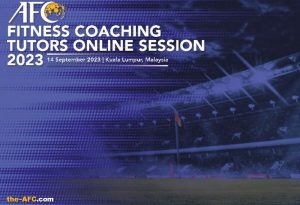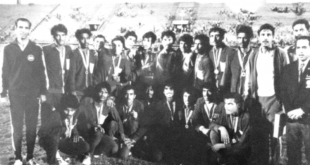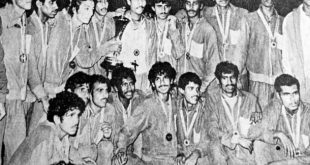 The Asian Football Confederation (AFC) conducted the AFC Fitness Coaching Tutors Online Session 2023 on Thursday to exchange knowledge on enhancing the fitness of the Continent’s footballers in order to help them succeed on the world’s biggest stages.
The Asian Football Confederation (AFC) conducted the AFC Fitness Coaching Tutors Online Session 2023 on Thursday to exchange knowledge on enhancing the fitness of the Continent’s footballers in order to help them succeed on the world’s biggest stages.
The session, which kicked off with an opening address by AFC Technical Director Andy Roxburgh, was attended by 34 participants representing 30 Member Associations (MAs), along guests, AFC Fitness Coaching Tutors, and several AFC Coach Education Panel members.
With the physical demands of the modern game being the key topic of discussion, the participants had the opportunity to hear from distinguished speakers such as FIFA Football Science Consultant Paul Bradley and renowned Fitness Expert Magni Mohr.
In the first half of the session, Bradley shared several valuable insights based on the physical data that was collected during the FIFA World Cup Qatar 2022.
Bradley also drew several parallels between the last two editions of the FIFA World Cup to denote the changing nature of the modern game, including tenets such as variations in the intensity produced by the participating teams, the growing prevalence of specialised positions, and the division of workload on the pitch owing to the increase in the number of substitutes.
“From the perspective of sprinting and high intensity, this FIFA World Cup registered numbers which are exponentially higher than the earlier edition in Russia. In the modern game, the central areas of the pitch are blocked and the wings are used much more for launching offensive threats,” explained the Brit.
“In this day and age, players are much more active than what we have seen traditionally. Thus, as fitness specialists, the responsibility lies on us to know how to condition our players that meet the physical demands of the game repeatedly without breaking down.”
In the second half of the session, Mohr shared his research on the latest trends in fitness training and stressed the importance of combining technical knowledge of the game with that of the science.
Drawing examples through decades, Mohr also outlined the manner in which technology has been used in the past to study fitness and fatigue as well as the changes that may be expected in the coming years, and drew special attention to the growing need to personalise training.
“It is important to understand the physiological aspects of football. Team sports always come with complexities where the skill set of one player maybe be wildly different from another,” said the Danish University researcher.
“With football becoming more and more physically demanding, we need to turn our focus towards understanding fatigue and finding ways to reduce exhaustion.”
His sentiments were echoed by Roxburgh, who in his closing remarks said: “There is an increasing need for training to be more personal. Each player has a job to do on the pitch: someone might be covering great distances while others may be playing at an exceptionally high level of intensity. Thus, generic training is not going to suffice and players at the top level will require individually curated training and recovery.”
 Arunava about Football A look at football & the world through my eyes!
Arunava about Football A look at football & the world through my eyes!



